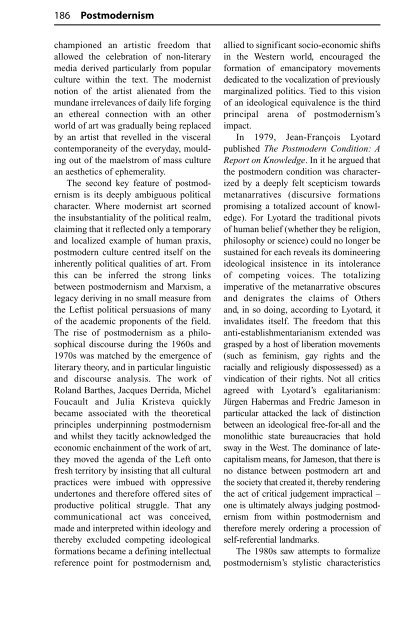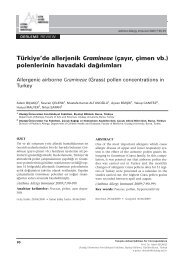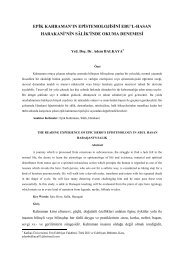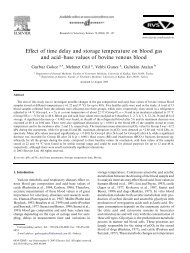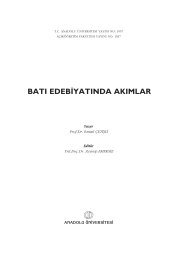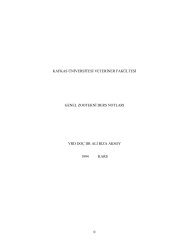The Routledge Dictionary of Literary Terms
The Routledge Dictionary of Literary Terms
The Routledge Dictionary of Literary Terms
Create successful ePaper yourself
Turn your PDF publications into a flip-book with our unique Google optimized e-Paper software.
186 Postmodernism<br />
championed an artistic freedom that<br />
allowed the celebration <strong>of</strong> non-literary<br />
media derived particularly from popular<br />
culture within the text. <strong>The</strong> modernist<br />
notion <strong>of</strong> the artist alienated from the<br />
mundane irrelevances <strong>of</strong> daily life forging<br />
an ethereal connection with an other<br />
world <strong>of</strong> art was gradually being replaced<br />
by an artist that revelled in the visceral<br />
contemporaneity <strong>of</strong> the everyday, moulding<br />
out <strong>of</strong> the maelstrom <strong>of</strong> mass culture<br />
an aesthetics <strong>of</strong> ephemerality.<br />
<strong>The</strong> second key feature <strong>of</strong> postmodernism<br />
is its deeply ambiguous political<br />
character. Where modernist art scorned<br />
the insubstantiality <strong>of</strong> the political realm,<br />
claiming that it reflected only a temporary<br />
and localized example <strong>of</strong> human praxis,<br />
postmodern culture centred itself on the<br />
inherently political qualities <strong>of</strong> art. From<br />
this can be inferred the strong links<br />
between postmodernism and Marxism, a<br />
legacy deriving in no small measure from<br />
the Leftist political persuasions <strong>of</strong> many<br />
<strong>of</strong> the academic proponents <strong>of</strong> the field.<br />
<strong>The</strong> rise <strong>of</strong> postmodernism as a philosophical<br />
discourse during the 1960s and<br />
1970s was matched by the emergence <strong>of</strong><br />
literary theory, and in particular linguistic<br />
and discourse analysis. <strong>The</strong> work <strong>of</strong><br />
Roland Barthes, Jacques Derrida, Michel<br />
Foucault and Julia Kristeva quickly<br />
became associated with the theoretical<br />
principles underpinning postmodernism<br />
and whilst they tacitly acknowledged the<br />
economic enchainment <strong>of</strong> the work <strong>of</strong> art,<br />
they moved the agenda <strong>of</strong> the Left onto<br />
fresh territory by insisting that all cultural<br />
practices were imbued with oppressive<br />
undertones and therefore <strong>of</strong>fered sites <strong>of</strong><br />
productive political struggle. That any<br />
communicational act was conceived,<br />
made and interpreted within ideology and<br />
thereby excluded competing ideological<br />
formations became a defining intellectual<br />
reference point for postmodernism and,<br />
allied to significant socio-economic shifts<br />
in the Western world, encouraged the<br />
formation <strong>of</strong> emancipatory movements<br />
dedicated to the vocalization <strong>of</strong> previously<br />
marginalized politics. Tied to this vision<br />
<strong>of</strong> an ideological equivalence is the third<br />
principal arena <strong>of</strong> postmodernism’s<br />
impact.<br />
In 1979, Jean-François Lyotard<br />
published <strong>The</strong> Postmodern Condition: A<br />
Report on Knowledge. In it he argued that<br />
the postmodern condition was characterized<br />
by a deeply felt scepticism towards<br />
metanarratives (discursive formations<br />
promising a totalized account <strong>of</strong> knowledge).<br />
For Lyotard the traditional pivots<br />
<strong>of</strong> human belief (whether they be religion,<br />
philosophy or science) could no longer be<br />
sustained for each reveals its domineering<br />
ideological insistence in its intolerance<br />
<strong>of</strong> competing voices. <strong>The</strong> totalizing<br />
imperative <strong>of</strong> the metanarrative obscures<br />
and denigrates the claims <strong>of</strong> Others<br />
and, in so doing, according to Lyotard, it<br />
invalidates itself. <strong>The</strong> freedom that this<br />
anti-establishmentarianism extended was<br />
grasped by a host <strong>of</strong> liberation movements<br />
(such as feminism, gay rights and the<br />
racially and religiously dispossessed) as a<br />
vindication <strong>of</strong> their rights. Not all critics<br />
agreed with Lyotard’s egalitarianism:<br />
Jürgen Habermas and Fredric Jameson in<br />
particular attacked the lack <strong>of</strong> distinction<br />
between an ideological free-for-all and the<br />
monolithic state bureaucracies that hold<br />
sway in the West. <strong>The</strong> dominance <strong>of</strong> latecapitalism<br />
means, for Jameson, that there is<br />
no distance between postmodern art and<br />
the society that created it, thereby rendering<br />
the act <strong>of</strong> critical judgement impractical –<br />
one is ultimately always judging postmodernism<br />
from within postmodernism and<br />
therefore merely ordering a procession <strong>of</strong><br />
self-referential landmarks.<br />
<strong>The</strong> 1980s saw attempts to formalize<br />
postmodernism’s stylistic characteristics


